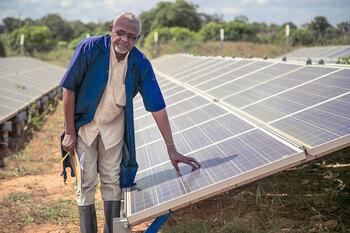Context
The shortage and inefficient supply of electricity are constraints on social and economic development in Tanzania. At the same time, in addition to mineral resources, the country has considerable potential to exploit renewable sources of energy, such as solar, wind and hydro power, biomass and geothermal energy. Some of these are already economically feasible today. However, the general conditions are still not conducive to ensuring the long-term supply of affordable, reliable and sustainable energy.
Objective
Conditions have improved for the long-term supply of affordable, reliable and sustainable energy throughout Tanzania.
Approach
The project supports policy-making, expansion planning and capacity development for the sustainable construction and operation of renewable energy facilities, and measures to promote energy efficiency.
GIZ is advising the Ministry of Energy and Minerals (MEM), which is the lead executing agency, the Energy and Water Utilities Regulatory Authority and the Rural Energy Agency. The topics addressed include improvements in the sector policy framework, the design of state support mechanisms and the involvement of the private sector to provide expertise. To build up technical knowledge and skills nationwide, the project works with multipliers such as associations and educational institutions, and supports pilot implementation activities. There is potential for establishing development partnerships with the private sector to set up decentralised, grid-connected renewable energy systems. Additionally some companies could potentially supply their own power using renewables, while energy efficiency measures could make electricity supply cheaper and more reliable.
The energy efficiency component of the project is being delivered by GFA Consulting Group.
Results
GIZ has advised MEM on the drafting of a sustainable national energy policy and strategy. A solid foundation has thus been laid for the development of a National Energy Efficiency Action Plan, the first version of which is expected to be completed before mid-2017. Funds for implementation are currently being negotiated with donors such as the European Union, the Swedish International Development Cooperation Agency (SIDA) and the United States Agency for International Development (USAID).
Following the delivery of energy management training at water utility companies, the project – together with the Association of Tanzanian Water Suppliers (ATAWAS) – encouraged the Morogoro Urban Water Supply and Sanitation Authority (MORUWASA) to appoint an energy manager and commit to a three-year action plan with the potential to deliver up to 690,000 kilowatt hours in annual savings.
In order to raise awareness of the importance of energy efficiency, the project collaborated with the Confederation of Tanzania Industries to create an award, which has been presented annually at the President’s Manufacturer of the Year Awards since 2005.
The Energy and Water Utilities Regulatory Authority has adopted a reform, changing the conditions it applies to its support for investments in renewable energies. This came into effect in April 2015, and includes new feed-in tariffs as well as competitive tendering processes for small-scale power producers. By mid-2016, nine such producers were feeding 33 megawatts into the national and local grids using renewable energies.
Advisory services have been provided since 2015 to 10 small-scale hydro power projects with a total future capacity of some 23 megawatts. Two of these plants were commissioned in late 2016 and a further four are set to be commissioned in 2017. The Tanzania Renewable Energy Association (TAREA) is making available the successful approaches of all project developers in the energy sector to promote their broad-based application.
A development partnership has been initiated with JUMEME Rural Power Supply Ltd., a joint venture for rural electrification in Tanzania. By providing access to affordable, reliable and sustainable energy, the partnership aims to create job opportunities and strengthen the position of women. It will identify and pave the way to points of access to health care, education, income-generating opportunities and finance. Up to 16 villages in north-western Tanzania with a total population of 82,000 are involved.
Improvements to general conditions have made Tanzania’s energy sector more attractive to local and international investors and created new employment opportunities for the local population.
